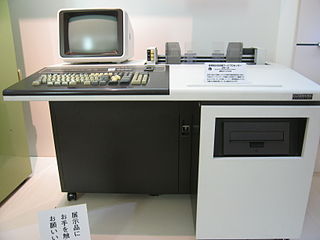
The Atari ST is a line of home computers from Atari Corporation and the successor to the Atari 8-bit family. The initial ST model, the 520ST, saw limited release in April–June 1985 and was widely available in July. The Atari ST is the first personal computer to come with a bitmapped color GUI, using a version of Digital Research's GEM released in February 1985. The 1040ST, released in 1986, is the first personal computer to ship with a megabyte of RAM in the base configuration and also the first with a cost-per-kilobyte of less than US$1.

AbiWord is a free and open-source software word processor. It was originally written in C++ and since version 3 it is based on GTK+ 3. The name "AbiWord" is derived from the root of the Spanish word "abierto", meaning "open".

UAE is a computer emulator which emulates the hardware of Commodore International's Amiga range of computers. Released under the GNU General Public License, UAE is free software.
In computing, a plug and play (PnP) device or computer bus, is one with a specification that facilitates the discovery of a hardware component in a system without the need for physical device configuration or user intervention in resolving resource conflicts. The term "plug and play" has since been expanded to a wide variety of applications to which the same lack of user setup applies.
MorphOS is an AmigaOS-like computer operating system. It is a mixed proprietary and open source OS produced for the Pegasos PowerPC processor based computer, PowerUP accelerator equipped Amiga computers, and a series of Freescale development boards that use the Genesi firmware, including the Efika and mobileGT. Since MorphOS 2.4, Apple's Mac Mini G4 is supported as well, and with the release of MorphOS 2.5 and MorphOS 2.6 the eMac and PowerMac G4 models are respectively supported. The release of MorphOS 3.2 added limited support for PowerMac G5. The core, based on the Quark microkernel, is proprietary, although several libraries and other parts are open source, such as Ambient desktop.

YAM is a MIME-compliant E-mail client written for AmigaOS and derivative operating systems. Originally created by Marcel Beck, it currently supports multiple user accounts, encrypted communications via OpenSSL and PGP, unlimited hierarchical folders and filters, a configurable GUI based on MUI, extensive ARexx support for automating tasks, and most of the features to be expected in modern E-mail clients.
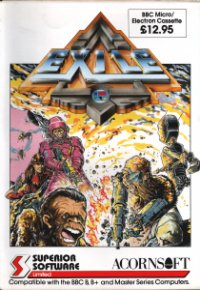
Exile is a single-player action-adventure video game originally published for the Acorn Electron and BBC Micro in 1988 by Superior Software and later ported to the Commodore 64, Amiga, CD32 and Atari ST, all published by Audiogenic. The game was designed and programmed by Peter Irvin and Jeremy Smith. It is often cited as one of the earliest examples of a Metroidvania style game and featured "realistic gravity, inertia and object mass years before players understood the concept of a physics engine... an astounding level of AI, stealth-based gameplay, a logical ecosystem governing the world's creatures and a teleportation mechanic that feels startlingly like a predecessor to Portal".

Thrust is a 1986 computer game programmed by Jeremy Smith for the BBC Micro and published by Superior Software. The player's aim is to manoeuvre a spaceship by rotating and thrusting, as it flies over a two-dimensional landscape and through caverns. The gameplay of Thrust was heavily inspired by Atari's Gravitar.

Tynesoft Computer Software was a software developer and publisher in the 1980s and early 1990s.
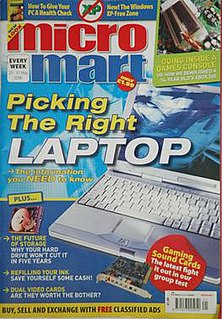
Micro Mart was a weekly computer magazine published in the United Kingdom by Dennis Publishing Ltd.. As of 2015, it had a circulation of 5,422. In a letter to subscribers in December 2016 it was announced that the magazine would cease publication with issue No 1445 : "After 30 amazing years of telling it like it is, Micro Mart magazine is logging off."
Amiga software is computer software engineered to run on the Amiga personal computer. Amiga software covers many applications, including productivity, digital art, games, commercial, freeware and hobbyist products. The market was active in the late 1980s and early 1990s but then dwindled. Most Amiga products were originally created directly for the Amiga computer, and were not ported from other platforms.

The Commodore A1060 Sidecar is an expansion hardware device developed by Commodore and released in 1986 for the Amiga 1000 computer. It features a complete PC XT-clone system mounted in an expansion case which connected to the expansion bus on the right side of the Amiga 1000 computer, sitting beside it similar to a motorcycle's sidecar, hence the name.
MicroIllusions, based in Granada Hills, California was a computer game developer and publisher of the home computer era. MicroIllusions, as a company, was a strong supporter of the Commodore Amiga and typically released titles on that platform before porting it to others. Activision cancelled them as an affiliated publisher after a year of signing them up. The company went out of business in or about 1990.

AmigaOS 4 is a line of Amiga operating systems which runs on PowerPC microprocessors. It is mainly based on AmigaOS 3.1 source code developed by Commodore, and partially on version 3.9 developed by Haage & Partner. "The Final Update" was released on 24 December 2006 after five years of development by the Belgian company Hyperion Entertainment under license from Amiga, Inc. for AmigaOne registered users.
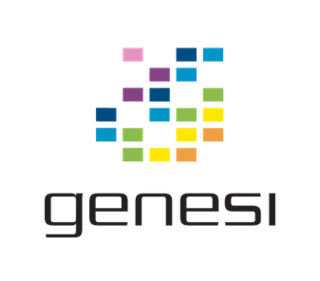
Genesi is an international group of technology and consulting companies in the United States, Mexico and Germany. It is most widely known for designing and manufacturing ARM architecture and Power ISA computing devices. The Genesi Group consists of Genesi USA Inc., Genesi Americas LLC, Genesi Europe UG, Red Efika, bPlan GmbH and the affiliated non-profit organization Power2People.
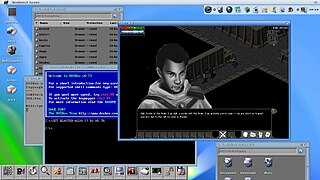
AROS Research Operating System is a free and open-source multi media centric implementation of the AmigaOS 3.1 APIs. Designed to be portable and flexible, ports are currently available for x86-based and PowerPC-based PCs in native and hosted flavors, with other architectures in development. AROS, in a show of full circle, was also ported to the m68k-based Amiga 1200, and there's also an ARM port for the Raspberry Pi series.
This article deals with productivity software created for the Amiga line of computers and covers the AmigaOS operating system and its derivates AROS and MorphOS and is a split of main article Amiga software. See also related articles Amiga Internet and communications software, Amiga music software, Amiga programming languages, and Amiga support and maintenance software for other information regarding software that run on Amiga.

The Amiga CD32, styled Amiga CD32 and code-named "Spellbound", is a 32 bit home video game console developed by Commodore and released in western Europe, Australia, Canada and Brazil. It was first announced at the Science Museum in London on July 16, 1993, and was released in September of the same year.
Micropub (MP) is a W3C Recommendation that describes a client–server protocol based on HTTP to create, update, and delete posts on servers using web or native app clients. Micropub was originally developed in the IndieWebCamp community, contributed to W3C, and published as a W3C working draft on 2016-01-28. As of 2017-05-23 it is a W3C Recommendation.

